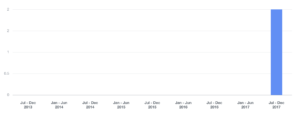Feature image via facebook May 15, 2018: A bar graph shows newest Transparency report displaying the number of content restrictions in Lebanon.
In Facebook’s newly published Transparency report, the company revealed it restricted or removed content in Lebanon for the first time since it began issuing the reports in 2013. The report also includes information about “legal requests from governments” and the implementation of its community standards in the latter half of 2017.
Although Facebook has previously provided user account information at the request of the Lebanese government, the period from July to December 2017 marked the first time the social media platform had restricted content because of a local law.
Facebook did not specify which law was violated, only that the decision was made “in response to private reports related to defamation.” Global requests to restrict content were down from 28,036 in the first half of this year to 14,294 during this period.
Also during this period, Facebook once again provided the Lebanese government with user account information. Out of the six requests made by the government, Facebook provided data for two of the four emergency requests, but neither of the two legal requests.
Emergency requests can only be submitted by law enforcement officials when there is “a matter involving imminent harm to a child or risk of death or serious physical injury to any person and requiring disclosure of information without delay.” Facebook previously responded to emergency requests from the Lebanese authorities four times in 2016. The company does not report which government agencies are responsible for these requests.
The Transparency report also covers internet disruptions, all of which have been previously reported, and information about how Facebook deals with hate speech and intellectual property infringement.


